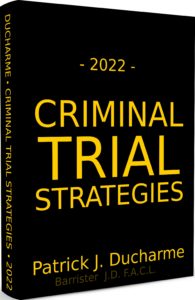Our judges exercise province-wide jurisdiction. It is quite common for a Judge who normally presides in Essex County to travel to another county such as Chatham-Kent to conduct a trial there. In other words, our judges are mobile. In recent years, these county jurisdictions have been categorized by region. Several county jurisdictions make up a region. A senior administrative Judge, appointed for that purpose, in a particular region, assigns the judges in that region to hear cases within the region.
A Judge becomes “seized” of a matter when a plea has been entered and/or evidence has been called. A Judge also becomes “seized” of a matter if that Judge receives a guilty plea from an accused. Once a Judge becomes seized of a matter, and is, for any reason, unable to continue, the proceedings may be continued before another Judge who has jurisdiction to try the accused pursuant to section 669.2 of the Code.
If a Judge receives a plea but no evidence is adduced then another Judge has jurisdiction to hear the proceedings if the original Judge is unavailable.1 If a verdict has been rendered, another Judge may continue and impose sentence where guilt is found. If no verdict is declared, another Judge may recommence the trial. Of course, a trial Judge has jurisdiction to declare a mistrial in compelling circumstances when inadmissible evidence and/or extremely prejudicial evidence is improperly disclosed. The new trial that is ordered need not be presided over by the same Judge.
The non-exhaustive list of reasons why a Judge would be “unable to continue” has been held to include illness, absence and appointment to a higher court. In addition, a successor Judge has jurisdiction under this section to take over a pre-trial application for a stay under the Charter after the trial Judge’s recusal from the motion on the grounds of bias.2 If a trial Judge recuses herself during a pre-trial application to stay proceedings, another Judge of the same court is able to hear the application. The authority of the alternate Judge to hear and decide the application may be founded on the authority of a superior court Judge to hear an application for a remedy under subsection 24(1) of the Charter; or the authority of subsection 669.2(1) of the Code, which permits transfer of jurisdiction from one trial Judge to another Judge of the same court where the trial Judge is unable to continue to preside for any reason.
Every Judge has the same power and authority to preserve order in a court over which she presides as may be exercised by the superior court of criminal jurisdiction of the province. Every court has the power to commit for contempt in the face of that court, within the limits of the language set forth in this section. The power to cite for contempt, however, is to be used for the preservation of order in the courtroom and is not to be used for other reasons or to be invoked well after the proceedings in question have ended.
The above is the an excerpt of Patrick J Ducharme’s book, Criminal Trial Strategies, available at Amazon or in bulk through MedicaLegal Publishing.
Read or listen to the Preface and Introduction and subscribe to Patrick Ducharme’s Youtube Channel.

